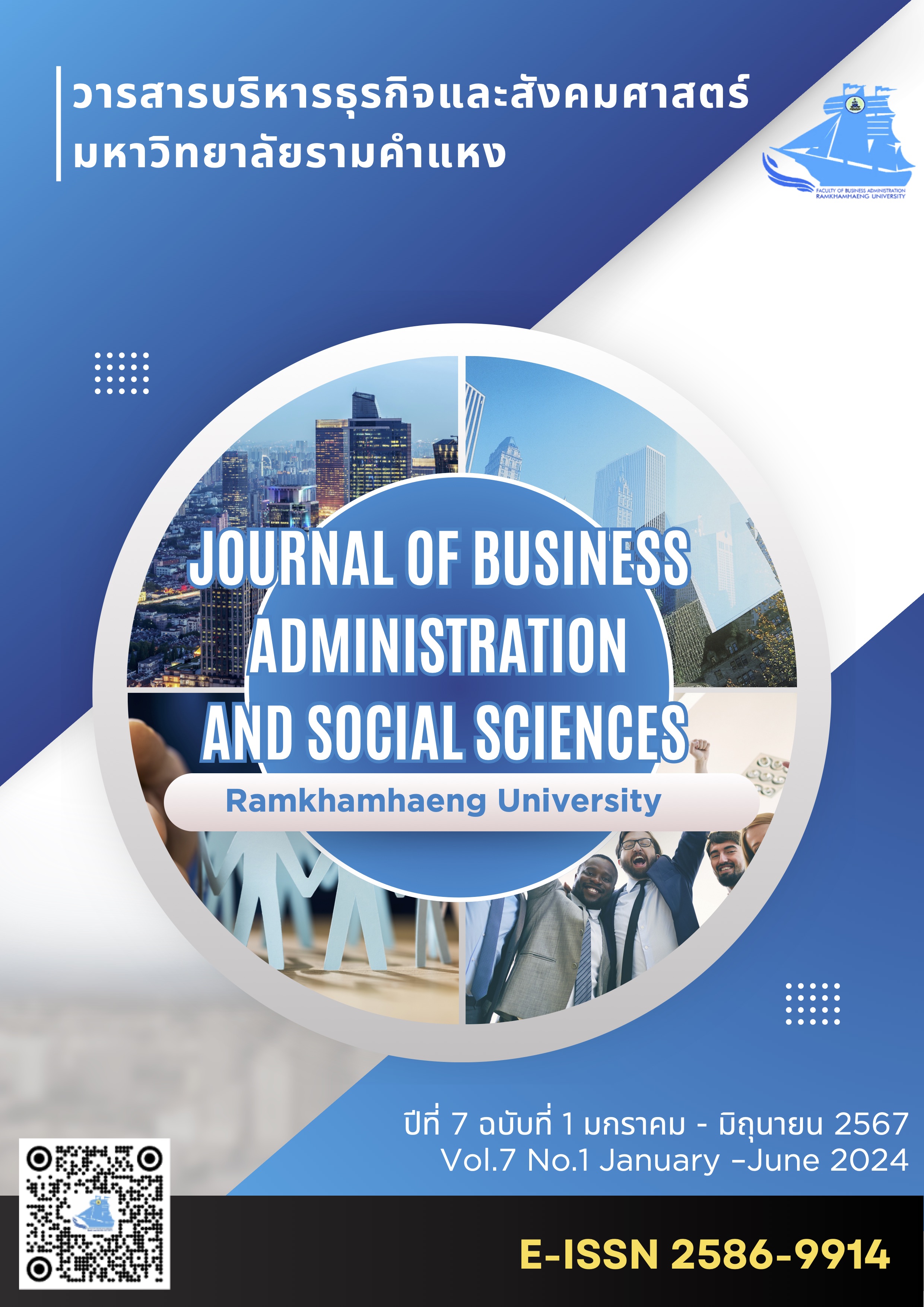Ethics in Human Resource Work and Creative Organizations: Perspectives from Executives and Employees in Modern Organizations
Main Article Content
Abstract
ABSTRACT
Ethics is used in conjunction with organizational operations because it is an important characteristic of workers in hierarchy of control. This article aims to explain ethics in human resource and organizational is a combination of ethics, morality, code of conduct and social responsibility from the perspective of employees and executives in modern organizations which provide an appropriate guideline for managing human resource and organizational behavior for creative operations. Ethics in human resources work that for employees and executives towards society including being a corporate entrepreneurship. Organizational ethics focuses on human resource work system and organization which can be developed through the human resource system strengthen work for team members. From the study, it was found that various organizations have ethical workers that will be made the organization accepted by people in society.
Keyword: Creative Ethics, Human Resource, Organization
Article Details

This work is licensed under a Creative Commons Attribution-NonCommercial-NoDerivatives 4.0 International License.
เนื้อหาและข้อมูลในบทความที่ลงตีพิมพ์ในวารสารบริหารธุรกิจและสังคมศาสตร์ มหาวิทยาลัยรามคำแหง ถือเป็นข้อคิดเห็นและความรับผิดชอบของผู้เขียนบทความโดยตรง ซึ่งกองบรรณาธิการไม่จำเป็นต้องเห็นด้วย หรือร่วมรับผิดชอบใดๆ
บทความ ข้อมูล เนื้อหา รูปภาพ ฯลฯ ที่ได้รับการตีพิมพ์ในวารสารบริหารธุรกิจและสังคมศาสตร์ มหาวิทยาลัยรามคำแหง ถือเป็นลิขสิทธิ์ของวารสารบริหารธุรกิจและสังคมศาสตร์ มหาวิทยาลัยรามคำแหง หากบุคคลหรือหน่วยงานใดต้องการนำบทความทั้งหมดหรือส่วนหนึ่งส่วนใดไปเผยแพร่ต่อ หรือเพื่อกระทำการใดๆ จะต้องได้รับอนุญาตเป็นลายลักษณ์อักษรจากวารสารบริหารธุรกิจและสังคมศาสตร์ มหาวิทยาลัยรามคำแหง ก่อนเท่านั้น
References
จารุวรรณ ชอบประดิถ. (2561). จริยธรรมในการดำเนินธุรกิจที่ส่งผลต่อภาพลักษณ์องค์การตามความคิดเห็นของ
พนักงานองค์การธุรกิจจังหวัดนครสวรรค์. การประชุมวิชาการระดับชาติ “วิทยาการจัดการวิชาการ 2018 : การวิจัยและนวัตกรรมเพื่อการพัฒนา ท้องถิ่นสู่ประเทศไทย 4.0 ”จัดทำโดยเครือข่ายความร่วมมือทางวิชาการ คณะวิทยาการจัดการ มหาวิทยาลัยราชภัฏภาคเหนือ, ตาก : มหาวิทยาลัยราชภัฏกำแพงเพชร. วันที่ 2 กุมภาพันธ์ พ.ศ. 2561.
จำเนียร จวงตระกูล. (2563). การพัฒนาทรัพยากรมนุษย์: ทฤษฎีและการปฏิบัติ. กรุงเทพฯ : ซีเอ็ด
ยูเคชั่น.
ชูชัย สมิทธิไกร. (2556). การสรรหา การคัดเลือก และการประเมินผลการปฏิบัติงานของบุคลากร (พิมพ์ครั้งที่ 4). กรุงเทพฯ: จุฬาลงกรณ์มหาวิทยาลัย.
เทพศักดิ์ บุณยรัตพันธุ์. (2559). แนวคิดและหลักการของการบริการสาธารณะ หน่วยที่ 1. ในเอกสารการสอนชุดวิชาการบริหารการบริการสาธารณะ (พิมพ์ครั้งที่ 6). นนทบุรี: มหาวิทยาลัยสุโขทัยธรรมาธิราช.
เทียม โชควัฒนา. (2550). คำสอนจากนายห้างเทียม โชควัฒนา. กรุงเทพฯ: ตถาตา.
เนตร์พัณณา ยาวิราช. (2551). จริยธรรมธุรกิจ (พิมพ์ครั้งที่ 2). กรุงเทพฯ: ทริปเพิ้ล กรุ๊ป.
พยอม วงศ์สารศรี. (2551). การบริหารทรัพยากรมนุษย์ (พิมพ์ครั้งที่ 2). กรุงเทพฯ: มหาวิทยาลัย
ราชภัฏสวนดุสิต.
รพีพรรณ ฉัตรเลิศยศ. (2552). จริยธรรมของผู้บริหาร. วารสารนักบริหาร, 29(4), 23-28.
ศุภนารี พิรส และธรรศวัตร์ ไชยเยชน์. (2565). จริยธรรมทางธุรกิจที่ส่งผลต่อการดำเนินงานของ
ผู้ประกอบการธุรกิจขนาดกลางและขนาดย่อมเจนเนอเรชั่นเอ็กซ์และเจนเนอเรชั่นวายในจังหวัดพิษณุโลก. วารสารวิทยาการจัดการมหาวิทยาลัยราชภัฏพิบูลสงคราม, 4(1), 1-17.
ศิริเกตุ ปริมาณเสวี. (2552). จริยธรรมในการดำเนินธุรกิจที่มีผลต่อภาพลักษณ์โดยรวมในอุตสาหกรรมเภสัช
ภัณฑ์. สารนิพนธ์ บริหารธุรกิจมหาบัณฑิต (การจัดการ) กรุงเทพฯ : บัณฑิตวิทยาลัย มหาวิทยาลัยศรีนครินทรวิโรฒ.
ศันสนีย์ ชุมพลบัญชร. (2555). จริยธรรมทางธุรกิจของผู้บริหารที่มีต่อพนักงานในมุมมองทาง พระพุทธศาสนา. วิทยานิพนธ์พุทธศาสตรดุษฎีบัณฑิต (พระพุทธศาสนา). กรุงเทพฯ : บัณฑิต
วิทยาลัย มหาวิทยาลัยมหาจุฬาลงกรณ์ราชวิทยาลัย.
สมภพ ชีวรัฐพัฒน์. (2539). จริยธรรมกับชีวิต. กรุงเทพฯ: นานาสิ่งพิมพ์.
สุดใจ เขียนภักดี และคณะ. (2559). การศึกษาแนวทางจริยธรรมทางธุรกิจในการจัดการทรัพยากรมนุษย์
และองค์การเชิงสร้างสรรค์ตามความคิดเห็นของผู้บริหารและพนักงาน: การวิจัยเชิงคุณภาพ.
รายงานการวิจัย. สถาบันเทคโนโลยีแห่งสุวรรณภูมิ.
สุนันทา เลาหนันทน์. (2556). การพัฒนาองค์การ (พิมพ์ครั้งที่ 2). กรุงเทพฯ: ดีดี บุ๊คสโตร์.
เสริมศักดิ์ วิศาลาภรณ์. (2555). จริยธรรมสร้างสรรค์องค์การ. เอกสารประกอบการบรรยายรายวิชา
การพัฒนาองค์การ. มหาวิทยาลัยธุรกิจบัณฑิตย์.
Aristotle. (1999). Nicomachean Ethics. Kitchener : Batoche Books.
Bowman, J. S., & West, J. P. (2015). Public Servive Ethics : Individual and Institutional
Responsibilities. London : SAGE Publication Ltd.
Hoffman, M. L. (1979). Development of moral thought, feeling, and behavior. American
Psychologist, 34(10), 958-966.
Jones, G. R, & George, J. M. (2014). Contemporary Management. 8thed. Singapore: McGraw-Hill.
Menzel, D. C. (2001). Ethics and Public Management. Public administration and
Public policy, 91, 349-364.
Mondy, R. W., & Martocchio, J. J. (2016). Human Resource Management. 14thed. United States
of America: Pearson.
Schermerhorn, J. R. (2011). Introduction to Management (11th ed.). Asia: John. Wiley & Sons.


